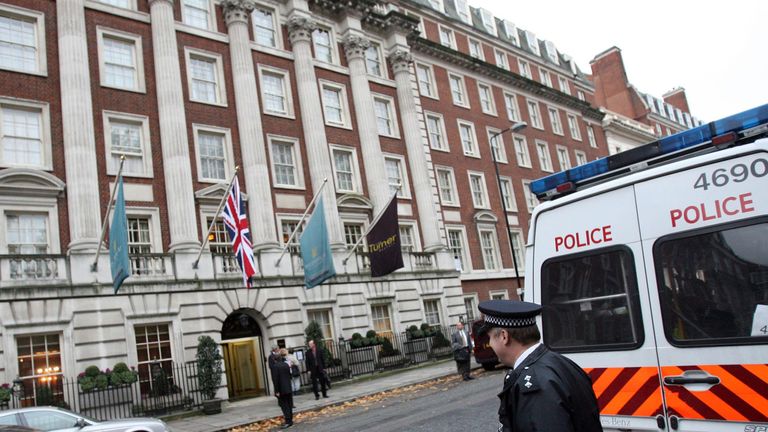[ad_1]
One of the men accused of assassinating Alexander Litvinenko in London has died of COVID-19.
Dmitry Kovtun, together with Andrei Lugovoy, is alleged to have carried out the 2006 killing on behalf of Russia’s Federal Security Service (FSB).
Kovtun died in a Moscow hospital, the Russian TASS news agency said on Saturday.
Lugovoy, now a prominent member of Russia’s parliament, said he was mourning the death of a “close and faithful friend”, the agency reported.
Mr Litvinenko, a British citizen, was a former KGB agent who went on to work for MI6 after fleeing to the UK.
He had also become an outspoken critic of Russian President Vladimir Putin.
He died an agonising death after being poisoned in London after his tea was laced with Polonium 210, a rare and very potent radioactive isotope.
From his deathbed, he accused President Putin of ordering his killing, but the Kremlin has always denied any role.
Read more: Russia responsible for assassination in London, European Court of Human Rights rules
A judge at a British inquiry into the case concluded in 2016 that the murder was an operation of Russia’s FSB spy agency that was probably approved by its director at the time, Nikolai Patrushev, and by President Putin himself.
They inquiry also found that former KGB bodyguard Lugovoy and fellow Russian Kovtun carried out the killing.
British investigators found traces of polonium at sites across London where the two men had been, including in offices, hotels, planes and the Arsenal football stadium.
They denied carrying out the poisoning, and Russia refused to extradite them to face trial.
Tensions between Mr Litvinenko and President Putin dated back to their only face-to-face meeting in 1998, when Mr Putin was head of the FSB and Mr Litvinenko was pushing for reforms of the intelligence service.
Read more: Alexander Litvinenko Murder – A Timeline
Mr Litvinenko’s death led to international outcry and further strained relations between Moscow and the West.
Fingers were again pointed at the Kremlin over poisonings on British soil in 2018, when attempts were made to assassinate former Russian spy Sergei Skripal and his daughter Yulia with a novichok nerve agent .
Three Russian men have been charged over the Salisbury poisonings but British authorities have not yet been able to bring them to trial.
[ad_2]


